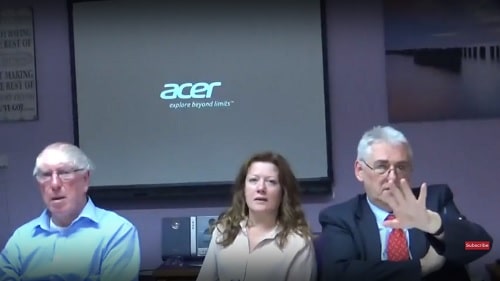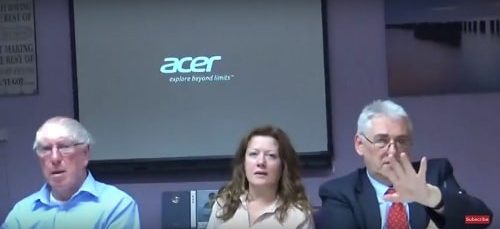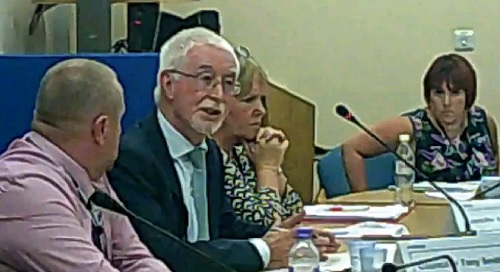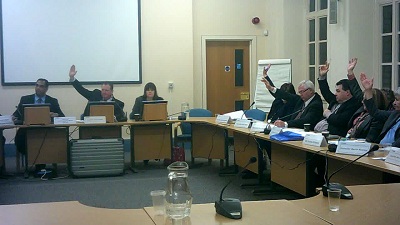What happened between Wirral Council and the Education Funding Agency over the minimum funding guarantee?
I’ve received a fuller response from the Education Funding Agency over my Freedom of Information request to the EFA about communications between themselves and Wirral Council over an application for exemption for the minimum funding guarantee (which was later withdrawn). Following the internal review the emails were now include who they were sent from and to and the dates as well as the emails about what happened after and Wirral Council’s withdrawal of their application for an exemption from the minimum funding guarantee requirements.
I see even a civil servant in the Department of Education expressed a similar sort of frustration (but in very a very diplomatic way) to that that the parents of children at Lyndale School had in dealing with Wirral Council officers. Gavin Monument (a civil servant who’s the School Funding Policy Adviser at the Education Funding Agency which is part of the Department of Education) states in an email to a Wirral Council officer dated 17th February 2014 “For some reason we are really struggling to understand your approach at this end and we do want to make sure we get it right when it gets sent to the Minister.”
As the issue of the minimum funding guarantee is connected to the issue of Lyndale School’s future that is currently being consulted on, I’m including the email exchanges below. Some of the statements made in these emails seem to directly contradict what was stated during public meetings by some Wirral Council officers on this matter.
=======================================================================================================
From: Roberts, Andrew D. [mailto:andrewroberts@wirral.gov.uk]
Sent: 03 January 2014 15:31
To: HOWKINS, Keith [keith.howkins@education.gsi.gov.uk]
Cc: FUNDING, ReformTeam [reformteam.funding@education.gsi.gov.uk]
Subject: RE: 237: Wirral 344 Special SchoFUNDING, ReformTeam ols exemption request
Hello Keith
Thanks for comments. I hadn’t picked up the change in grant conditions, or that protected rates apply only to Special Schools or Special Academies.
Option 3 is a calculation comparing each top-up band at a school with the rate used in 2013-14 (less 1.5%). I think from your comments below this no longer applies.
Option 2 compares the average amount that would be paid to a school using the new top ups and existing pupil data, with the amount that has been paid in 2013-14 (less 1.5%).
Option 1 – No MFG was supported by 4 out of 11 Special Schools
Kilgarth
Foxfield
Elleray Park
Orrets Meadow
Option 2 Average MFG was supported by 2 Special Schools
Claremount
Stanley
Regards
Andrew
=======================================================================================================
From: keith.howkins@education.gsi.gov.uk [mailto:keith.howkins@education.gsi.gov.uk]
Sent: 30 December 2013 15:24
To: Roberts, Andrew D. [mailto:andrewroberts@wirral.gov.uk]
Cc: FUNDING, ReformTeam [reformteam.funding@education.gsi.gov.uk]
Subject: RE: 237: Wirral 344 Special Schools exemption request
Andrew – thanks for sending this through.
Could you explain more about the difference between options 2 and 3 please, and send through details on which option each special school supported?
We appreciate that there was some confusion over the exact wording of the protection requirements. What we said originally about these applying to each top-up rate was incorrect; the correct wording is what you have quoted below and applies to the overall budget if the number and overall type of places remained the same. I’m not sure if this changes anything you have sent.
As a point of information, the protection arrangements in the conditions of grant only apply to special schools and academies. There is no protection requirement for special units or AP, so you do not need any approval for proposals in relation to these.
Keith
Keith Howkins
Team Leader, Funding Reform Team
Maintained Schools Division
Education Funding Agency
Department for Education
2 St Paul’s Place
Sheffield. S1 2FJ
=======================================================================================================
From: Roberts, Andrew D. [mailto:andrewroberts@wirral.gov.uk]
Sent: 12 December 2013 12:35
To: FUNDING, ReformTeam [mailto:reformteam.funding@education.gsi.gov.uk]
Subject: 237: Wirral 344 Special Schools exemption request
This letter is requesting exemption from the requirement for an SEN MFG included within the 2014 – 2015 DSG additional conditions of grant. Paragraph g “In deciding on top up funding rates for the pupils it will place in special schools …. and the total number and type of places received the same in the 2 financial years the school or Academy budget would receive by no more than 1.5% in cash between 2013 – 2014 and 2014 – 2015.”
Over the past 12 months a Schools Forum SEN finance group has met to develop proposals for high needs funding and particularly to agree a banded approach for specialist SEN provision.
A banded system (with 5 bands) was developed taking account of a number of issues:
· The need for stability
· The fluctuation arising from part year places and the need to have places available.
· To take account of the increasing demands and population with social communication needs and to recognise the resource intensive nature of provision for children with profound and multiple learning difficulties.
These 5 bands have also been applied to SEN resourced base provision in mainstream schools and academies. The bands used take account of the same needs identified within Wirral’s 11 special schools and in addition gives an equivalent level of funding for each child.
Changes of this nature will result in movement of resources and a number of schools will as a result receive more funding and others will receive less. However proposals include a contingency fund to financially support any specialist provision that may experience financial difficulties.
The SEN top up proposals were subject to a full consultation with all schools and providers in Wirral, commencing on 3rd July and closing on 18th October. The consultation papers included an illustration for each school of the funding a school might receive using current numbers and numbers at capacity, compared with the level of funding provided in 2013 – 2014. In addition there has been a series of meetings with schools to discuss the changes suggested.
24 responses were received including 10 out of 11 special schools and 6 out of 14 school SEN resource bases. Overall the responses were supportive and in favour of the local authority’s proposals.
Since the consultation was launched schools were asked a supplementary question about views on seeking an exemption from the requirement for an SEN MFG. This approach has been adopted because the MFG will not work with the new top up bands. Without capping the MFG costs an additional £800,000 which would be unaffordable, whilst capping would defer the introduction of the new top-up structure.
Schools were asked for their preferences based on a table illustrating:
No MFG (7)
An Average MFG (phased over 3 years) (5)
A full MFG (0)
The responses are shown in brackets above.
This issue was discussed at the Schools Forum meeting on 13th November 2013. The recommendation from the forum was “That Forum supports an application to the EFA for an exemption from the requirement to use an MFG (Option 1) on Top Ups for 2014 – 2015, and failing that Forum request the EFA agree the use of an average MFG (Option 2)”
A number of papers are attached to this e-mail including:
School Forum Agenda from 13 November 2013:
– Element 3 Top up funding arrangements for pupils with high needs (SEN) and for pupils attending Alternative Provision. (This report includes the consultation paper and letter to schools about the MFG)
– An extract from the Schools Forum minutes
Please let me know if you would like further details.
I look forward to hearing from you
Yours sincerely
Andrew Roberts
Senior Manager – School Funding & Resources
Children and Young People’s Department
Wirral Council
Tel: 0151 666 4249
Fax: 0151 666 4338
andrewroberts@wirral.gov.uk
Visit our website: www.wirral.gov.uk
=======================================================================================================
From: Roberts, Andrew D. [mailto:andrewroberts@wirral.gov.uk]
Sent: 14 March 2014 10:52
To: MONUMENT, Gavin [mailto:gavin.mounment@education.gsi.gov.uk]
Subject: RE: Wirral 344 Special Schools exemption request- additional information
Hello Gavin
Further to our meting I am writing to confirm the withdrawal of Wirral’s application for an MFG exemption for High Needs. The clarification provided by the EFA indicates the additional cost for Maintained Special Schools be be in the region of £80,000, which is affordable within the High Needs Budget. It is the intention to make the same offer available to Resourced Base provision in Primary, Secondary schools and academies, although this may be for one year only.
Thanks you for your advice.
Regards
Andrew
=======================================================================================================
From: gavin.mounment@education.gsi.gov.uk [mailto:gavin.mounment@education.gsi.gov.uk]
Sent: 17 February 2014 14:09
To: Roberts, Andrew D. [mailto:andrewroberts@wirral.gov.uk]
Subject: RE: Wirral 344 Special Schools exemption request- additional information
Hi Andrew,
Sorry for the delay in coming back to you on this. I thought Keith had ruled out your original option 3 – which compared each top-up band at a school with the rate used in 13-14 – as the conditions of grant confirmed the protection applies to the overall budget level. So I thought we were down to options 1 and 2
For some reason we are really struggling to understand your approach at this end and we do want to make sure we get it right when it gets sent to the Minister. I’m due to be over in the North West later in the week and I’m wondering if the simplest solution would be to pop across for a chat and see if we can clear this up face-to-face rather than via e-mail. It probably won’t take very long to do and be less frustrating to you guys who have worked all this through whilst I’ve got a mental block on it. Would this sound a good idea? I can do Wednesday afternoon or any time on Thursday if this would work for you.
Thanks
Gavin.
Gavin Monument
School Funding Policy Adviser
Maintained Schools Division
Mowden Hall
Staindrop Road
Darlington
Tel: 01325 735842
Mob: 07824 895783
www.education.gov.uk
=======================================================================================================
From: Roberts, Andrew D. [mailto:andrewroberts@wirral.gov.uk]
Sent: 20 January 2014 13:05
To: MONUMENT, Gavin [mailto:gavin.mounment@education.gsi.gov.uk]
Subject: RE: Wirral 344 Special Schools exemption request- additional information
Hello Gavin
Keith indicated that Option 1 is not correct – the MFG applies to the overall budget (ie I think this means average values and Option 2).Similarly the calculation is only required for Special Schools not Resourced Bases (so is a lesser requirement)The request is for no MFG, but if we need to have one then it should be Option 2.
Is there any idea on timescales?
Thanks
Andrew
=======================================================================================================
From: gavin.mounment@education.gsi.gov.uk [mailto:gavin.mounment@education.gsi.gov.uk]
Sent: 14 January 2014 11:29
To: Roberts, Andrew D.
Subject: RE: Wirral 344 Special Schools exemption request- additional information
Thanks Andrew,
That’s been really helpful as I’ve been able to track through the calculations for the options. Can I check my understanding though, just to make sure we’ve captured your request correctly.
Your preference is to run with option 1, which uses the banding system for the schools, but creates a much larger MFG requirement. So, you are requesting an MFG exclusion to be able to move straight to the new banding system. If this is not approved you would move to option 2, which uses an average rate for each school as this creates a much lower MFG requirement. Are you also asking for an MFG exclusion for option 2, or will you run with this option including the MFG impact?
Many thanks
Gavin.
Gavin Monument
School Funding Policy Adviser
Maintained Schools Division
Mowden Hall
Staindrop Road
Darlington
Tel: 01325 735842
Mob: 07824 895783
www.education.gov.uk
=======================================================================================================
From: Roberts, Andrew D. [mailto:andrewroberts@wirral.gov.uk]
Sent: 08 January 2014 17:59
To: FUNDING, ReformTeam [mailto:reformteam.funding@education.gsi.gov.uk]
Cc: MONUMENT, Gavin [mailto:gavin.mounment@education.gsi.gov.uk]
Subject: Wirral 344 Special Schools exemption request- additional information
Hello Gavin
The attached is a summary of the MFG calculation. The end column shows the MFG for each school. The average band rate shown is a weighted band average for each school which is then compared with the MFG rate.
Pupil numbers used are:
Elleray and Stanley 90
Lyndale 25
Observatory 45
Andrew Roberts
Senior Manager – School Funding & Resources
Children and Young People’s Department
Wirral Council
Tel: 0151 666 4249
Fax: 0151 666 4338
andrewroberts@wirral.gov.uk
Visit our website: www.wirral.gov.uk
If you click on any of the buttons below, you’ll be doing me a favour by sharing this article with other people.
53.402022-3.070415



